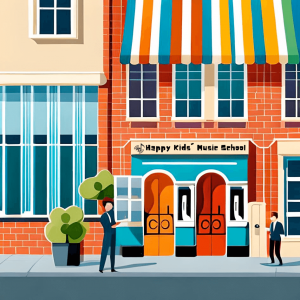 Opening a music school can be a rewarding and lucrative business venture. Still, one of the most important decisions you’ll make is choosing the right location. A well-chosen location can attract students and make your school a success. The wrong location can make attracting students difficult and ultimately lead to failure. In this article, we’ll explore the key factors to consider when choosing the right location for your music school. In our article, 10 Tips for Starting a Music School that Succeeds, we briefly discussed choosing a suitable location. This article will detail what to think about when choosing the ideal location for your music lesson studio. Below are ten factors to consider.
Opening a music school can be a rewarding and lucrative business venture. Still, one of the most important decisions you’ll make is choosing the right location. A well-chosen location can attract students and make your school a success. The wrong location can make attracting students difficult and ultimately lead to failure. In this article, we’ll explore the key factors to consider when choosing the right location for your music school. In our article, 10 Tips for Starting a Music School that Succeeds, we briefly discussed choosing a suitable location. This article will detail what to think about when choosing the ideal location for your music lesson studio. Below are ten factors to consider.
10 factors to consider when choosing the right location to start a music school
Choosing the right location for a music school depends on many factors. What may be a priority for one music teacher may differ from another. Your location will become an important part of your marketing strategy and how you advertise your music lessons. While this list of factors can serve as a helpful guide, it’s important to consider which factors are most significant for your specific situation. For instance, the cost may be the most important factor for you, whereas demographics may be more important for another teacher. Ultimately, the key is to weigh each factor according to how you envision your music school evolving over time.
1. Demographics
One of the most important factors to consider when choosing the location for your music school is the area’s demographics. Assuming you plan to primarily teach children, you’ll want to target an area with a high concentration of families with children, as they are the most likely demographic to be interested in music lessons. A study showed that 50% of all music students quit music lessons by age 17, while most quit between 15 and 17 [1]. This is a time when kids are starting to prepare to leave their childhood home and go off to college. As a music teacher, targeting younger kids ages 5 to 10 makes a lot of sense. Music teachers should consider the following demographic factors:
- Age: Look for areas with a high percentage of families with children, as they are more likely to enroll their kids in music lessons.
- Income: Make sure the area has a median income that can support the cost of music lessons.
- Education: Areas with higher levels of education tend to have more parents interested and willing to provide their children with music lessons.
2. Competition
Another important factor to consider when choosing the location for your music school is the level of competition in the area. Look for areas that don’t have too many music schools or instructors offering the same type of music lessons you plan to offer. Conduct market research to determine the following:
- Number of music schools/instructors: Research the number of music schools and instructors in the area. Consider how many of them offer the same type of music lessons you plan to offer.
- Quality of competition: Look at the quality of the competition in the area. Consider the reputation of the existing schools and instructors and determine if you can compete with them. To evaluate the quality of competition, check the Google reviews for rival schools. If a school has negative reviews or a low number of reviews, it may suggest that you can effectively compete against them in that particular area.
3. Accessibility
When choosing the location for your music school, you’ll want to ensure that it is easily accessible to your students. Consider the following accessibility factors:
- Parking: Ensure that the location has ample parking available for students and parents who may be dropping off and picking up students.
- Distance: Consider the distance students and parents must travel to attend lessons. Try to choose a convenient location for most of your target audience. Note that you might be able to target two or three townships with a single music school if you choose a location conveniently located between them.
- Traffic: If your music school will be located in a congested area, consider how bad traffic can be, especially around rush hour when kids are finished with school. Parents may be unwilling or unable to sit in heavy traffic to get their children to music lessons.
4. Facilities
The facilities of your music school can have a significant impact on your success. Look for a location that has the following facilities or is easily adaptable to accommodate them:
- Classrooms: You’ll need adequate classroom space to accommodate your students and instructors. You’ll also want to noise-proof them to prevent music noise from one classroom from interfering with other lessons in adjacent classrooms.
- Practice rooms: Look for a location that has practice rooms available for students who need to practice between lessons.
- Performance space: Consider whether the location has a performance space available for recitals and concerts.
- Storage: Make sure the location has adequate storage space for instruments, music stands, and other equipment.
- Waiting area: Consider the activities that parents and other children can engage in while a student is taking a music lesson. For instance, a parent may be able to assist their other children with their homework while one child is taking a music lesson. Providing space for parents to do so can serve as a unique selling proposition (USP) for your music school.
5. Cost
The cost of the location is an important consideration when choosing the right location for your music school. Look for a location that you can afford while still meeting all of your needs. Determine how many lessons you’ll have to provide to break even each month. Consider the following cost factors:
- Rent: Research the rental rates in the area and determine if they fit within your budget.
- Utilities: Consider the cost of utilities such as electricity, gas, and water when choosing a location.
- Insurance: Determine the insurance cost for your music school and factor it into your budget.
6. Zoning and Permitting
Before you choose a location for your music school, it’s important to check local zoning regulations and permit requirements. Consider the following zoning and permitting factors:
- Zoning: Check local zoning regulations to ensure that the location is zoned for educational purposes.
- Permitting: Determine what type of permits you’ll need to operate a music school in the area. This may include business licenses, occupancy permits, and safety inspections.
7. Community Support
The local community’s support can significantly impact your music school’s success. Look for a location that supports the arts and education, with a strong community of musicians and music enthusiasts. Consider the following community support factors:
- Local music scene: Look for a location that has a thriving local music scene, with opportunities for students to perform and connect with other musicians.
- Arts organizations: Check for the presence of local arts organizations that can support your music school and help you connect with the community.
- Community involvement: Look for a location where the community is invested in education and the arts, with a strong network of parents and community leaders who are passionate about supporting young musicians.
8. Size of the Location
When choosing a location for a school or educational institution, the size of the location is an important factor. Here are some points to consider:
- Number of students: The size of the location should be suitable for the number of students that will be attending the school. A location that is too small can feel cramped and uncomfortable, while a location that is too large can feel empty and intimidating.
- Classroom sizes: The size of the classrooms is also important to consider. Classrooms should be large enough to accommodate the students comfortably, while also allowing for necessary equipment and materials.
- Future planning: The size of the location should also be appropriate for growth. You may want to start a music store or hire additional music teachers. You might start small and grow your music school over time. While you could move your location when you’re ready to grow, you risk losing students if the new location is far from the original location.
9. Location Visibility
Visibility is an important factor when choosing a location for an educational institution. Here are some points to consider:
- Street frontage: A location with good street frontage is important as it makes the school more visible to passersby. This can attract potential students and also make it easier for parents and students to locate the school. In this way, your location becomes a form of advertising, helping you market your music school.
- Signage: Good signage is also important for visibility. The school’s name and logo should be clearly displayed on the building or on a sign in front of the location.
- Accessibility: The location should also be easily accessible by public transportation and have adequate parking facilities. This can make it easier for students and parents to get to the school, and can also make the school more visible to potential students who may be passing by.
10. Neighbors
A music school will make noise. Some adjacent businesses might not appreciate students practicing drum solos right next to them. Additionally, you might not want to have your music school just down the road from seedy businesses that might turn off parents. Consider these factors when thinking of neighboring businesses.
- Know your neighbors: Try to meet them and develop a friendly relationship with them. It’s a lot harder to complain about someone you have a relationship with than it is about someone you don’t.
- Investigate the area: Are there any neighbors in the area that might make your customers feel uncomfortable? If you wouldn’t want your kids spending time in such an area, you probably shouldn’t expect others to want to take lessons in that area either.
- Listen for external noise: Is the location exceptionally noisy? Are their sirens from police cars or ambulances going off frequently? Are you blocks away from a railroad track where a train whistle is likely to blow as your students try to practice? The external noises near a music school could frustrate you and those taking lessons from you.
Conclusion
Choosing the right location for your music school is a critical decision that can significantly impact your music studio’s success. By considering the factors listed above, you can make an informed decision that will help you attract students, compete effectively with other music schools, and provide a supportive and engaging learning environment for your students.
When choosing a location for your music school, it’s important to take your time and do your research. Don’t rush into a decision based solely on the cost or availability of a location. Consider all of the factors listed above, and be sure to visit each location in person to get a feel for the community and the facilities.
Ultimately, the success of your music school will depend on a variety of factors, but by choosing the right location, you can set your music school up for success and provide a valuable service to your community.
Sources:
- (Ji, J., Gao, Y., Yang, X., & Wei, Y. (2021). The Effects of Music Lessons on Cognitive Ability: Evidence from a Randomized Controlled Trial in China. PloS one, 16(10), e0259105.)



 Do you want to get more students and grow your music teaching business?
Do you want to get more students and grow your music teaching business?